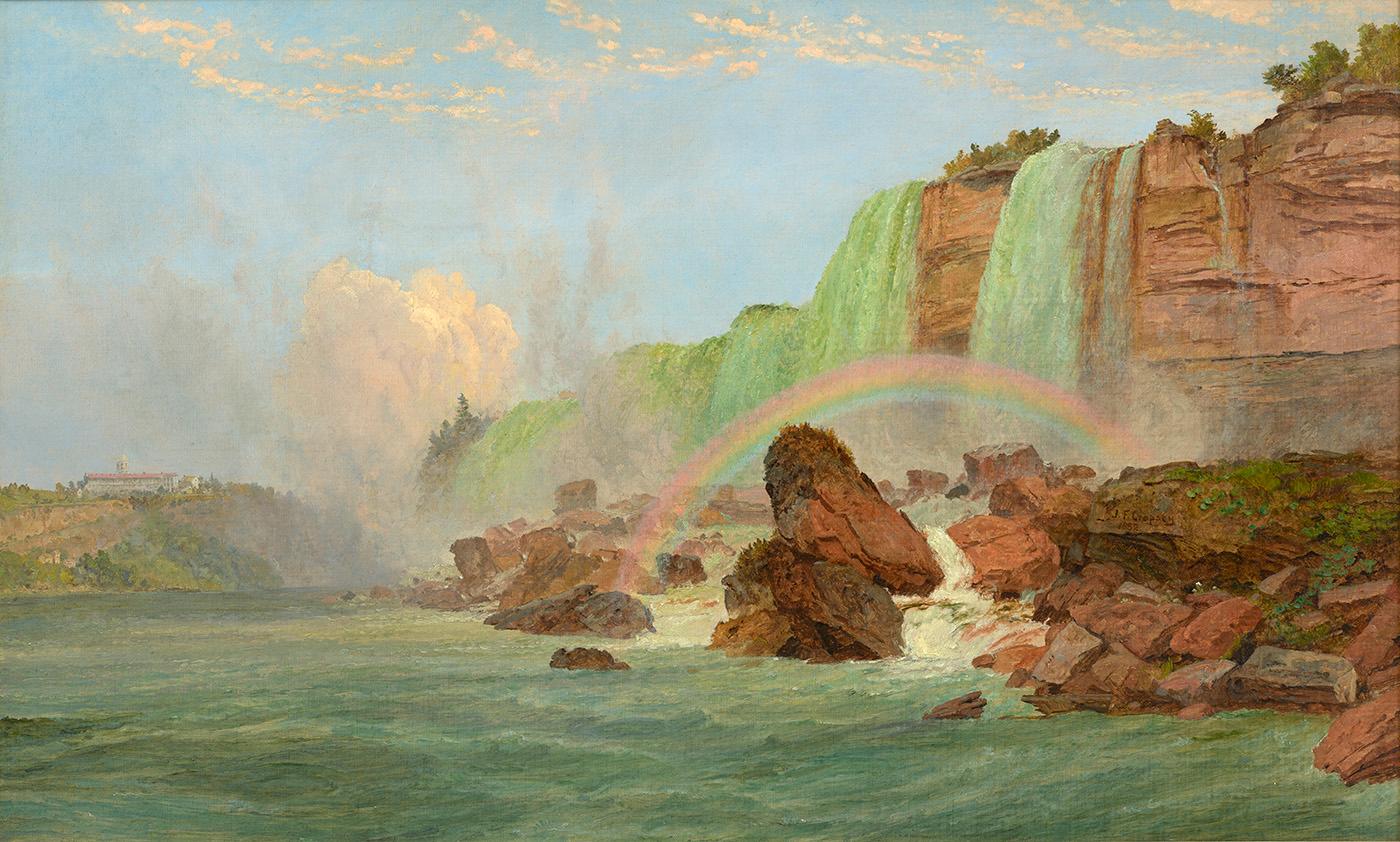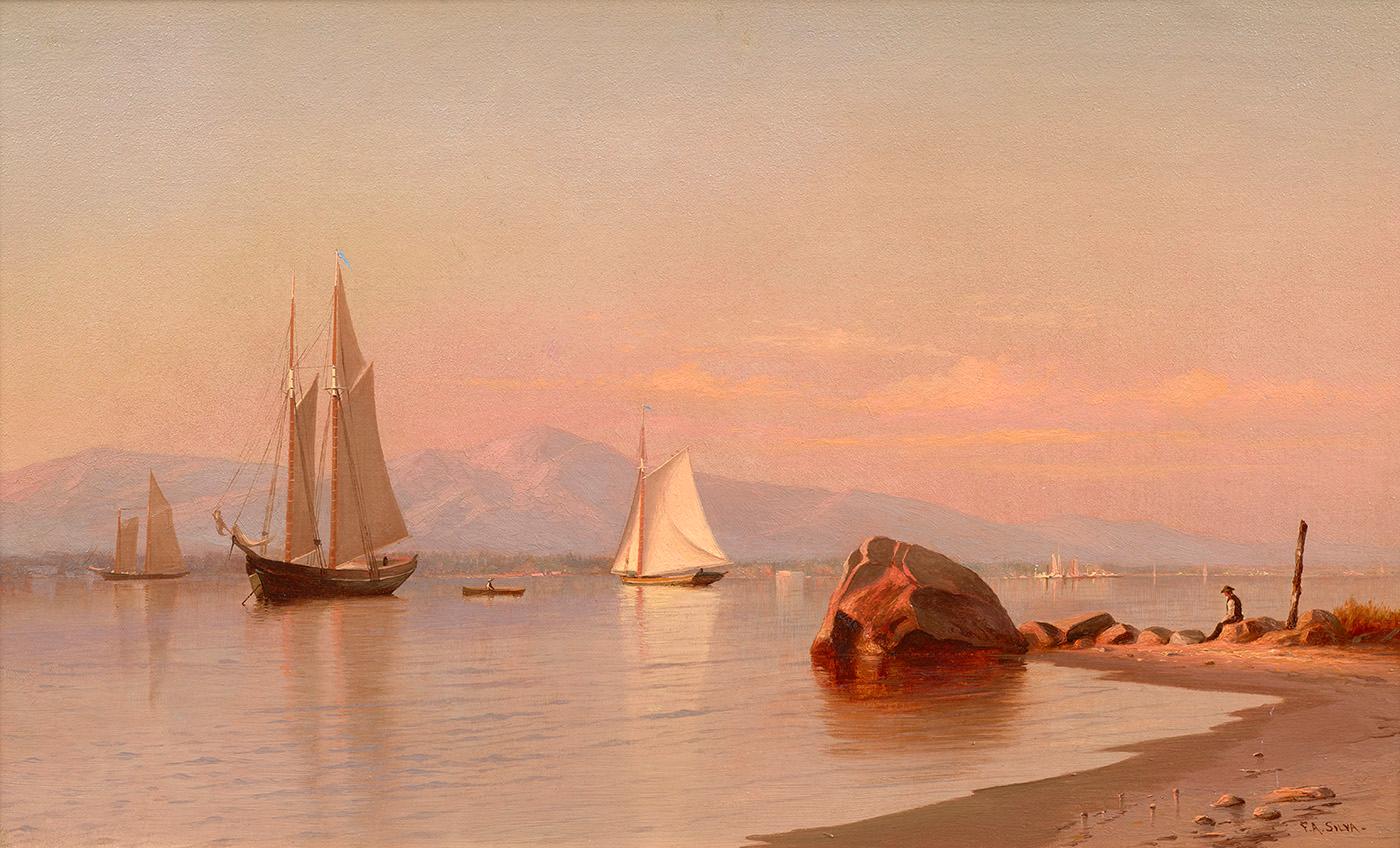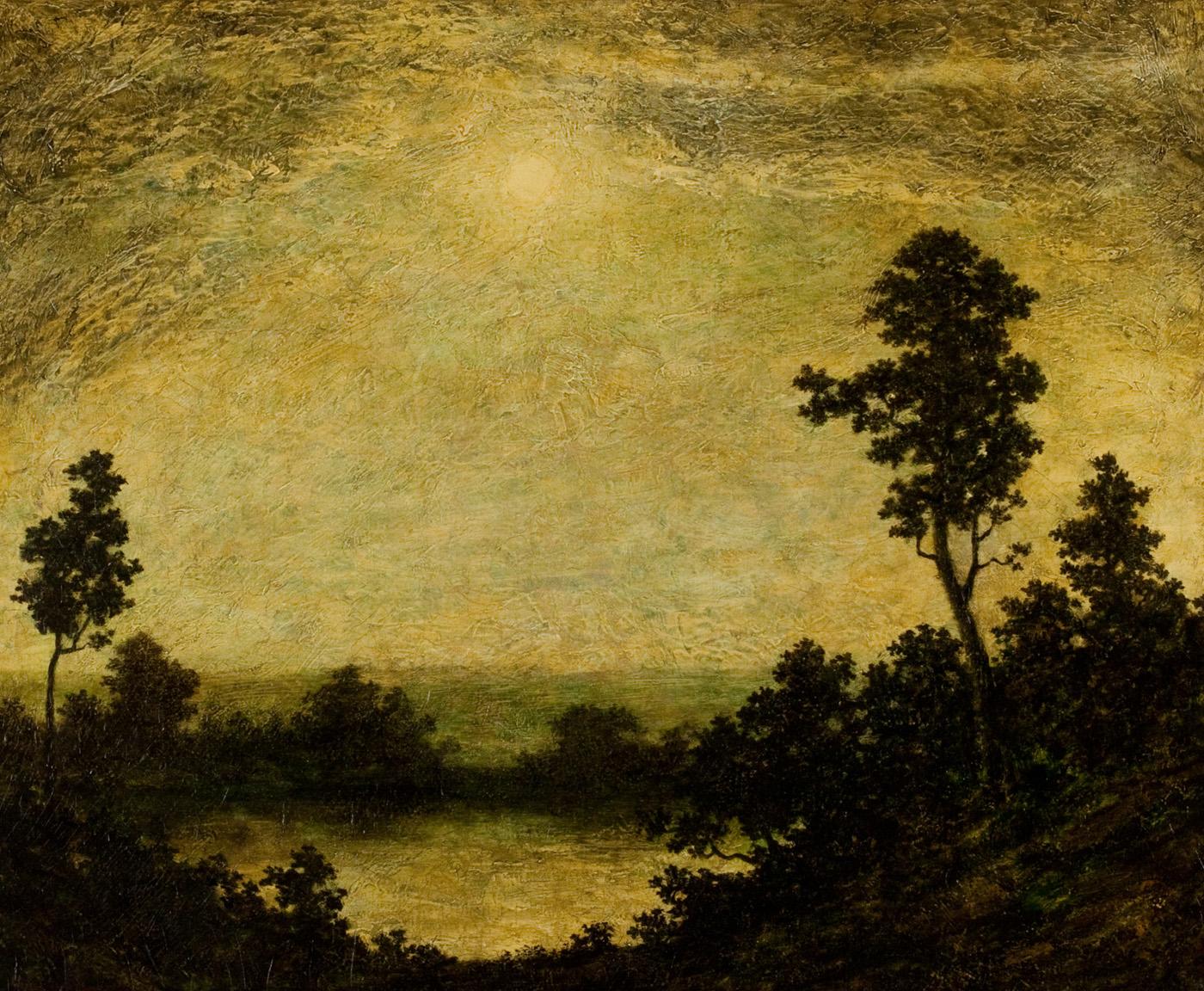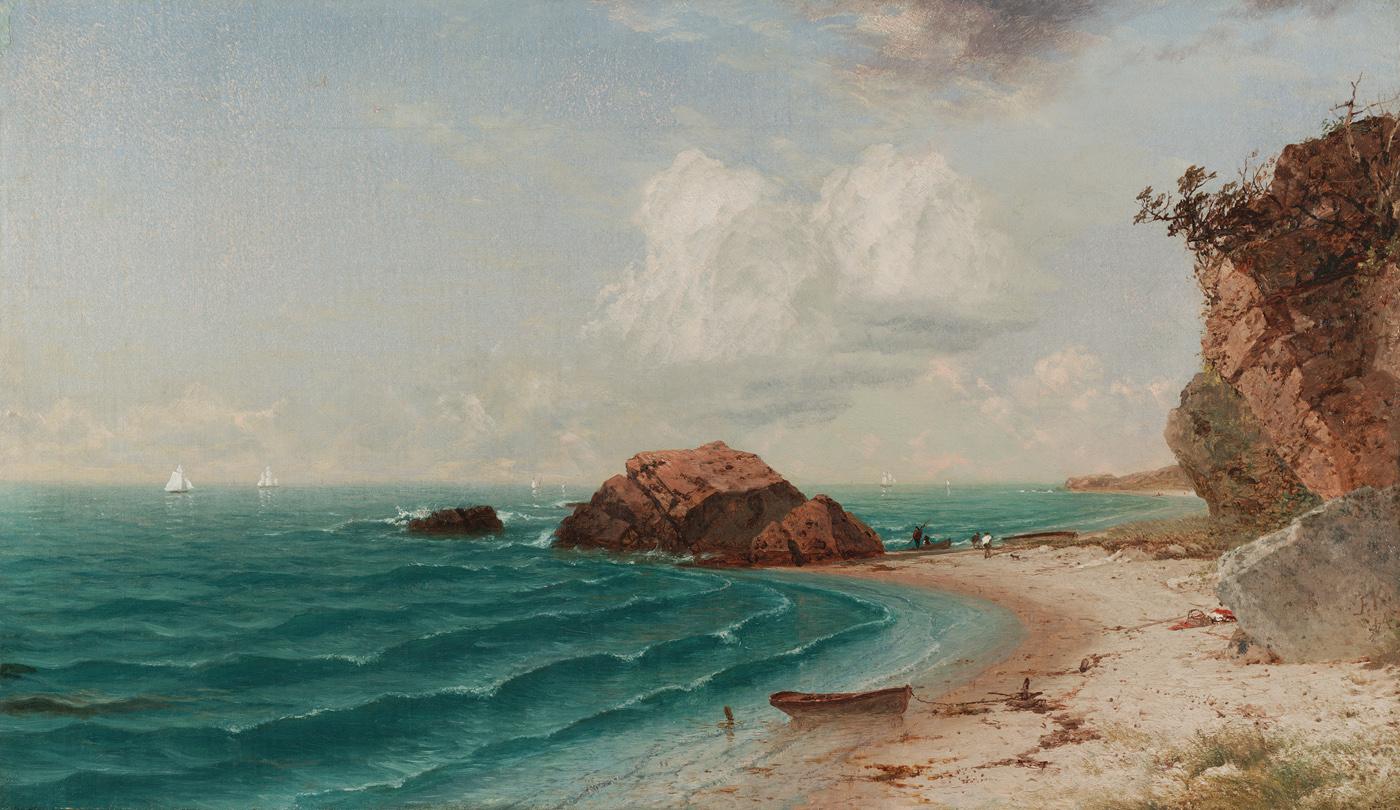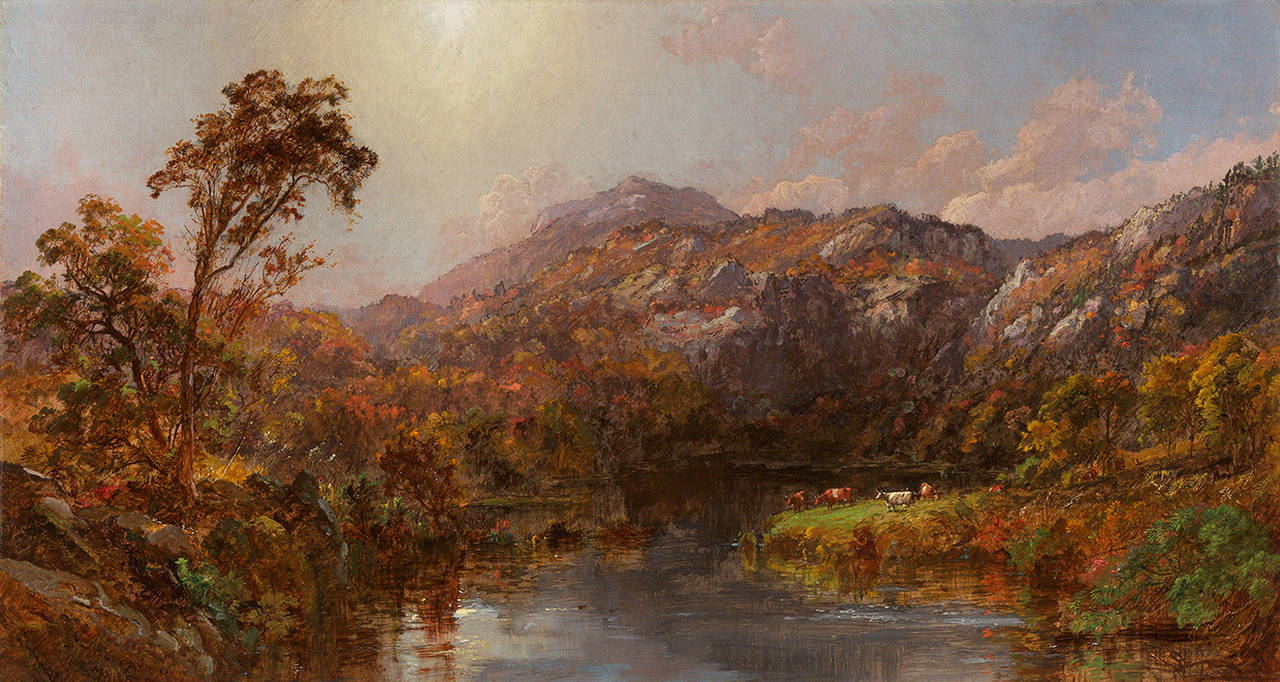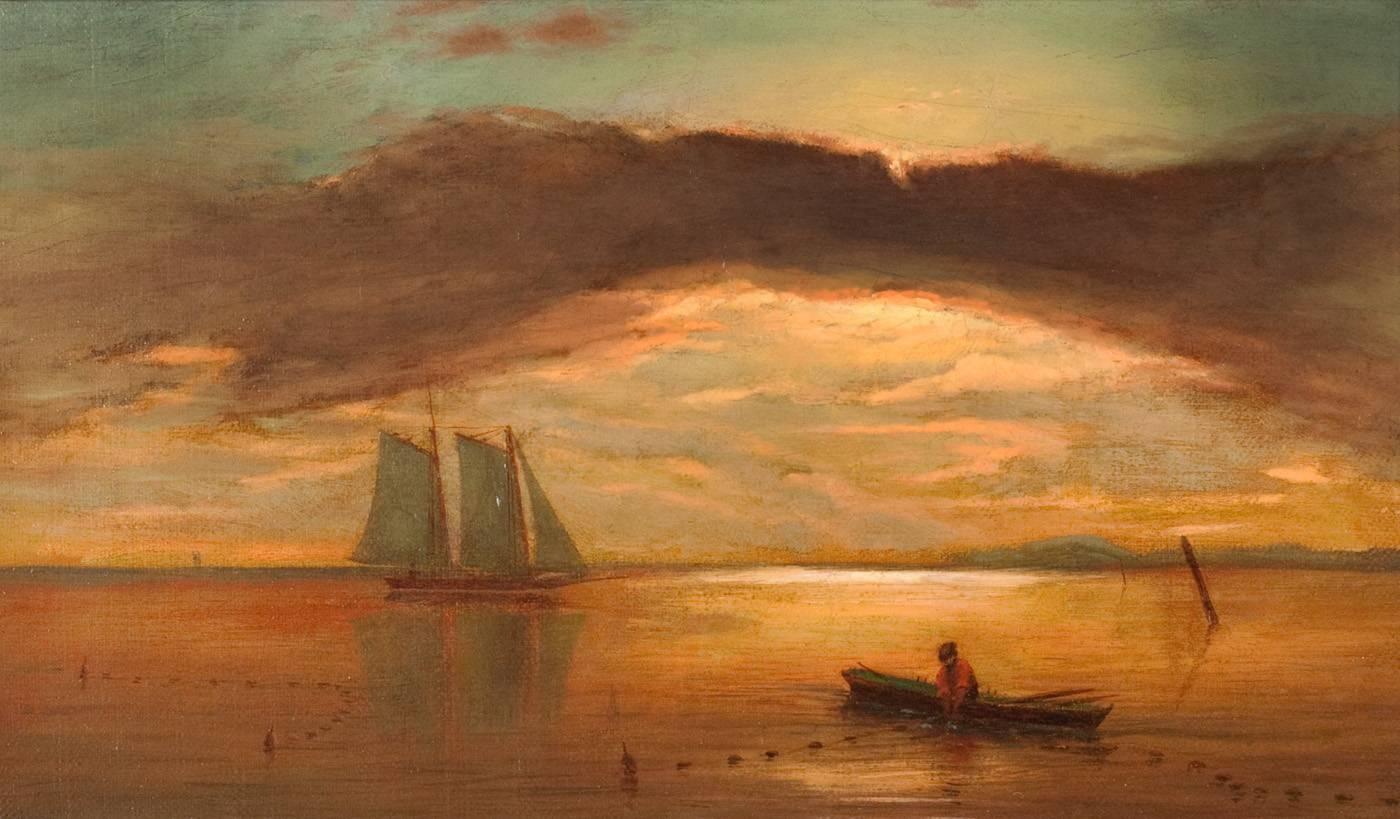Items Similar to River Landscape
Want more images or videos?
Request additional images or videos from the seller
1 of 2
John DolphRiver Landscape
About the Item
John Henry Dolph, is best known as painter of domestic animals, especially cats. He was born in 1835 in Fort Ann, New York, and spent much of his career there, although from 1857 to 1861, he worked in Ohio as a portrait and landscape painter. He also tried to find work in Chicago.
Moving to New York City in about 1865, he attracted attention with his scenes of American rural life, especially farm genre and animal life. Then for five years Dolph studied in Paris and Antwerp, where Louis van Kuyck tutored him in his specialty of animal painting, particularly horses.
After returning to New York City by 1872, and finding his farm scenes not very popular, Dolph tried painting portraits, medieval genre and architectural studies. Again, he had trouble finding an active market, but another type of painting did find buyers---dog and cat subjects, and especially cats. These subjects became so popular for him, that finally he devoted himself exclusively to it and was described as the "leading cat painter in America" in the September 1894 issue of Quarterly Illustrator. It was common that subtle bits of humor were woven into these paintings.
Active in the New York art scene, he had a studio in the Sherwood Building* in Manhattan, but also kept a country home on Long Island. He was elected an associate member of the National Academy of Design* in 1877, and a full member in 1898. Other memberships included the Lotos*, the Salmagundi*, and the Kit-Kat* clubs. He exhibited, and won a medal, at the Pan-American Expo* in 1901 in Buffalo.
Heart disease, however, plagued Dolph for years, and it was said that in his final days he become frustrated when he could not finish a painting of a favorite animal.
He died in New York in 1903 in the home of a close friend.
His daughter, Florence, donated a majority of his works, and other Dolph art holdings, to The University of Nebraska Art Collection at the Sheldon Museum in Lincoln. Additional pieces are in the collection of The Pennsylvania Academy of Fine Arts.
- Creator:John Dolph (1835 - 1903, American)
- Medium:
- Movement & Style:
- Period:
- Condition:The painting was professionally cleaned and varnished. No inpainting under u.v. light.
- Gallery Location:Saratoga Springs, NY
- Reference Number:1stDibs: LU1702460282
About the Seller
4.2
Vetted Seller
These experienced sellers undergo a comprehensive evaluation by our team of in-house experts.
Established in 1992
1stDibs seller since 2015
30 sales on 1stDibs
Typical response time: 19 hours
- ShippingRetrieving quote...Ships From: Saratoga Springs, NY
- Return PolicyA return for this item may be initiated within 3 days of delivery.
More From This SellerView All
- Indians in a LandscapeBy William Mason BrownLocated in Saratoga Springs, NYSigned lower left. Along with Martin Johnson Heade, William Mason Brown was among a very elite group of artists equally adept at landscape painting as well as still-life painting. H...Category
Late 19th Century Hudson River School Landscape Paintings
MaterialsCanvas, Oil
- California MillBy Hermann Ottomar HerzogLocated in Saratoga Springs, NYSigned & dated, lower left, 1869 Herman Ottomar Herzog was born in Bremen, Germany, on November 15, 1831. He studied art at the Dusseldorf Academy, starting in 1848, under several classical landscape painters. In 1855, Herzog made his first visit to Norway. The trip was a milestone in Herzog's career as it exposed him to the rugged landscape of the Norwegian wilderness and instilled in him a lifelong sense of nature that was to show in all his work. During the late 1850's and early 1860's, Herzog's fame spread throughout Europe. His paintings were collected for their dynamic realism and strong atmospheric effects. Among his patrons were several of Europe's royal families, including Queen Victoria of England and Grand Duke Alexander of Russia. He exhibited in the Paris Salon in 1863 and 1864, winning an Honorable Mention. While in Paris, it is thought that Herzog came into contact with the popular Barbizon School, whose adherents painted the grandeur and beauty of Nature in a romantic and realistic style. The effect of the Barbizon painters can also be seen in Herzog's poetic handling of mood and color. Although he was still in Europe, Herzog sent several paintings for exhibition at the Pennsylvania Academy from 1863 to 1869. He had several friends in the United States and they were developing a rather good demand for his work. It is not known exactly when Herzog decided to come to America. Sometime in the late 1860's he settled in Philadelphia. Besides wanting a developing market for his work, Herzog left Bremen due to rising political agitation by Prussia, which had just absorbed Bremen into its domain. In America, Herzog continued to paint his romantic landscapes, finding the American wilderness well suited to his style. In 1871, he traveled up the Hudson River on a painting tour. In 1873, he took his first trip west, going to Yosemite, then to Wyoming, Oregon, and along the West Coast to the Coronado Island, near the Mexican border. Herzog made several journeys west, finding each trip more fruitful than the last. He became known for his depictions of Yosemite, receiving great acclaim for a fine El Capitan, much in the style of his fellow countryman and painter Albert Bierstadt. His last trip west was in 1905, at the age of 74. In 1876, Herzog participated in the Centennial Exhibition in Philadelphia, showing a Norwegian scene and a Yosemite landscape...Category
1860s Hudson River School Landscape Paintings
MaterialsCanvas, Oil
- Whiteface Mt, Lake Placid NYBy William BradfordLocated in Saratoga Springs, NYSigned lower left A 19th-century marine painter, William Bradford is famous for his seascapes that reflect his background of being raised in an area known for whaling and other marine activities. During much of his career, his work focused on the Arctic region, which he depicted with strong color and spectacular lighting. Bradford was born and raised in New Bedford, Massachusetts to Quaker parents who disapproved of his desire for a painting career. He became a clerk in his father's dry goods shop in New Bedford but devoted his spare time to sketching, a diversion that caused him and his wife to lose a farm that had been given to them by his father-in- law. In the early 1850s, living in Fairhaven, he launched his professional career by selling portraits of ships for twenty-five dollars a piece. In 1854, he opened a studio and about this same time attracted the interest of Albert Van Beest, a Dutch painter who had come to America in 1845. He became Bradford's teacher and collaborator, and until his death in 1860, they painted together local scenes including seascapes and whaling pictures. In 1861, Bradford began a series of trips to Nova Scotia, Labrador, and Greenland, and painting and photographing the Arctic region became a consuming interest. He also published a book in London titled The Arctic Region, which he vividly illustrated with photographs pasted onto the page and he gave lectures accompanied by lantern slides...Category
Late 19th Century Hudson River School Landscape Paintings
MaterialsCanvas, Oil
- Fishing by the StreamLocated in Saratoga Springs, NYSigned lower rightCategory
1860s Hudson River School Landscape Paintings
MaterialsCanvas, Oil
- Pleasant DayBy Joseph Antonio HekkingLocated in Saratoga Springs, NYSigned lower left J. A. Hekking was a versatile and talented landscape painter who lived in New York and Connecticut and was active from the early 1850's to the later 1870's. Hekking was a frequent participant at major exhibitions. His paintings were inspired by the Adirondack and White Mountains, Connecticut, New York views, and the Jersey shore. He worked with Frederick Rondeland. His paintings were actively acquired by important collectors including J.S. Farrand, Sarah Holderby, N.L. Lindsey, T. Foster, and George Watter Vincent Smith. Hekking exhibited at the National Academy of Design (eight paintings between 1859 and 1875); the 1865 Michigan State Fair; the Crystal Palace in New York, 1853; Cosmopolitan Art Association, 1858; Utica Art Association, 1868; Buffalo Fine Arts Academy, 1869; Boston;1869; the Buffalo YMCA, 1861 and the Chicago Industrial...Category
Late 19th Century Hudson River School Landscape Paintings
MaterialsCanvas, Oil
- AusableBy William OngleyLocated in Saratoga Springs, NYSigned lower right. A landscape and marine painter, William Ongley was born in England in 1836 and came to America with his family and settled in New York. His art studies took him ...Category
Late 19th Century Hudson River School Landscape Paintings
MaterialsCanvas, Oil
You May Also Like
- Niagara Falls with View of Clifton HouseBy Jasper Francis CropseyLocated in New York, NYSigned and dated right of center: J.F. Cropsey / 1852Category
Mid-19th Century Hudson River School Landscape Paintings
MaterialsCanvas, Oil
- View on the Hudson, the Catskills in the DistanceBy Francis Augustus SilvaLocated in New York, NYSigned lower right: F.A. SILVA.Category
Late 19th Century Hudson River School Landscape Paintings
MaterialsOil, Canvas
- Into the NightBy Ralph Albert BlakelockLocated in New York, NYSigned lower left in arrowhead: RA Blakelock.Category
Late 19th Century Hudson River School Landscape Paintings
MaterialsCanvas, Oil
- New England Coastal Scene with FiguresBy John Frederick KensettLocated in New York, NYMonogramed and dated lower right: JF.K. / ‘64.Category
Mid-19th Century Hudson River School Landscape Paintings
MaterialsCanvas, Oil
- Landscape with Cows near Warwick, New YorkBy Jasper Francis CropseyLocated in New York, NYSigned and dated lower left: J. F. Cropsey / 1885Category
Late 19th Century Hudson River School Landscape Paintings
MaterialsCanvas, Oil
- View Down on the BayBy Edward RawstorneLocated in New York, NYRawstorne was active/lived in New York.Category
Mid-19th Century Hudson River School Landscape Paintings
MaterialsCanvas, Oil
Recently Viewed
View AllMore Ways To Browse
Cat Landscape
Pan America
Antique Long Johns
Antique Finish Painting
Hudson River School New York
John Hudson
American Hudson River Oil Paintings
19th Century River Scene Painting
Hudson River School American Landscape
John John Florence
Oil On Canvas Hudson River Painting
Hudson River 19th
Hudson River 19th Century
Oil On Canvas Hudson River School Painting
Dog And Cat
19th Century Hudson River School
19th Century Hudson River School Paintings
Nebraska Landscapes
